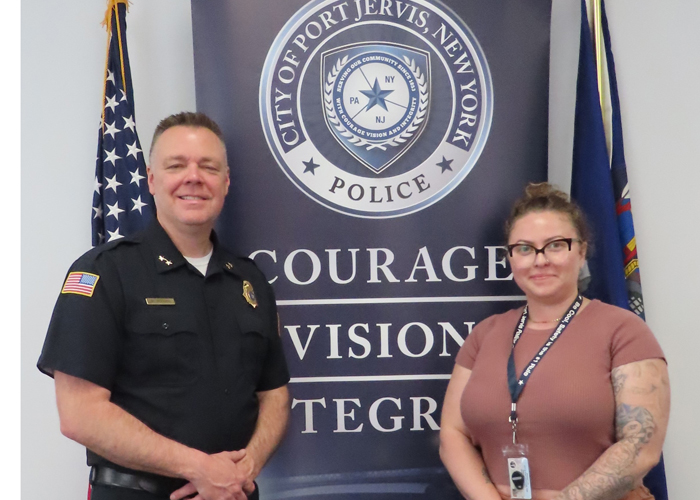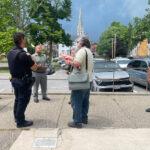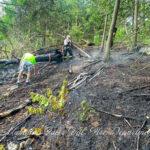PORT JERVIS – Port Jervis Police Department’s chief and staff have embraced what is an increasing national trend toward blending social work with policing to keep communities safe, while offering follow-up help to those struggling with any number of life issues.
Lisa Wattoff, a police social work intern with PJPD this year, has completed her Master of Social Work program at Adelphi University and is currently finishing her clinical certification. PJPD will accept a new intern participant with the Social Work Law Enforcement program this fall, which Wattoff participated in through earlier this year.
Wattoff echoed what Police Chief Worden shared about calls that police frequently respond to – repeat calls from people simply need help with ongoing social issues. Wattoff said people often reach out to the police for repeat issues, not knowing how to connect with the right resources or agencies to resolve their problems.
“There is a lack of funds available to many who have difficulty getting the appropriate services. Being on the edge of New York here in Port Jervis, many have tried to get the right help but have barriers, such as a lack of transportation,” Wattoff said. “Small issues can over time domino into something much larger. By being able to follow through in helping, and by building a rapport, a social worker is able to follow through in a non-judgmental way before a small problem becomes a criminal issue.”
While the police force is in tune with individuals and wants to help as much as possible, time does not always allow them to go back to check on people to find out how they are doing after a call, or to follow through on referrals for help or a mediator.
“People sometimes call the police because they are desperate for help with ongoing non-criminal problems. Nobody wants to routinely call the police. They want to change from a crisis situation, homelessness, substance abuse, or just the depth of what they may be going through. But they aren’t always able to do this on their own,” Wattoff said. “That’s where a social worker can help in finding solutions to repeat problems.”
While Wattoff is not a police officer, and is still in the process of being certified as a clinical social worker, she has found it to be very rewarding to work with the police and the school district on diverse issues in the Port Jervis community. These include problems that she feels have increased among youth since the pandemic, such as chronic absenteeism and reduced social interaction.
“These are our kids. We need to help. A phone call does not replace in-person interaction. Face-to-face is the crux of social work, whether it is in working with the school, the police force, or in the community,” Wattoff said. “I would love to come back permanently as a Social Work Law Enforcement worker, if able, and continue to help in this way.”
Wattoff’s supervisor, Dr. Isabel Logan, created the Social Work Law Enforcement Project that PJPD and other police agencies have been working through in recent years. SWLE, the first police social work academy in the United States, was launched by Logan after the death of George Floyd while in police custody in 2020.
Logan said the presence of a uniformed officer at times can automatically make people nervous. She views the SWLE program as not only allowing for the freeing up of police to handle other crisis situations, but as a calming force and bridge in the community overall.
“When you put a non-uniformed social worker in a situation, it automatically helps to deescalate and destress the individual,” Logan said. “It helps to reduce the risk of arrest and helps in non-violent mental health calls.”
Logan stressed that any intern in SWLE has to go through the police social work academy, and that any call social workers respond to requires that they are careful not to place themselves in a dangerous involvement or location. Law enforcement social workers are not police officers, and they are meant to supplement, not replace, a police officer’s function and duties.
This non-police, social work function is very welcome in Port Jervis Police Department, according to Worden and others on Port’s police force, one of a growing number of police divisions to involve social workers.








